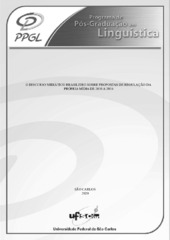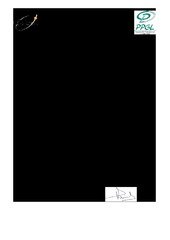| dc.contributor.author | Santos, Wilson Ricardo Barbosa dos | |
| dc.date.accessioned | 2021-08-31T16:07:44Z | |
| dc.date.available | 2021-08-31T16:07:44Z | |
| dc.date.issued | 2020-09-28 | |
| dc.identifier.citation | SANTOS, Wilson Ricardo Barbosa dos. O discurso midiático brasileiro sobre propostas de regulação da própria mídia de 2010 a 2016. 2020. Tese (Doutorado em Linguística) – Universidade Federal de São Carlos, São Carlos, 2020. Disponível em: https://repositorio.ufscar.br/handle/ufscar/14829. | * |
| dc.identifier.uri | https://repositorio.ufscar.br/handle/ufscar/14829 | |
| dc.description.abstract | This thesis discusses, describes, and analyzes the manifestation of meaning regarding media regulation, the regulation discourse’s conditions of emergence, and the discursive formations in conflict when addressed by these medias’ written texts, from January 2010 to December 2016. Our base is the French discourse analysis from Michel Foucault (2006; 2009; 2010) and Michel Pêcheux (2008; 2009b). In general, the media texts which addressed the possibility of their own regulation created “commentaries” (FOUCAULT, 2006) about the subject and the politicians who discussed the possibility (or not) of talking about it, multiplying the meaning of statements such as controle social da mídia, regulação da mídia, democratização da mídia and regulação econômica da mídia. These discourses addressed what is conceived as freedom of speech; moreover, they were related to intense changes in terms of politics, society and, mainly, technology. Considering two presidential elections (2010 and 2014), as well as transformations in the political scene with the irruption of Brazilian president Dilma Rousseff’s impeachment (2016) and Jair Bolsonaro’s election (2018), the theoretical-methodological basis and the analysis of media’s texts allowed us to describe discursive regularities and, therefore, outline elements of a short-term history about the right to speak freely in Brazil in the 21st century. We observed this occurred in different processes of attribution of the right to speak, related to the following events: i) the maintenance of the rights of speech, historically attributed to oligarchies, in which the possibility of emergence of the media regulation discussion in the electoral presidential political discourse was often related to the conservative media’s interpretation; ii) resistance movements to this hegemony in the progressive media, generating dissidence about what could have been the media regulation; iii) the silencing of this discussion with Michel Temer’s arrival (2016) at the presidency, as well as transformations in the production of meaning, especially about the limits of freedom of speech with Jair Bolsonaro’s (2018) election. To this end, we analyzed surfaces of emergence of Brazilian’s media written discourse, with the following distinct characteristics: i) media known as conservative, with broad distribution: the newspapers Folha de São Paulo and O Globo, as well as Veja magazine; ii) media considered as progressive: the newspaper Carta Capital, and the electronic portal Carta Maior. The objective was therefore to demonstrate the conditions of emergence of Brazilian media’s discourse about its own regulation, through the verification of the discursive-enunciative modalities in conflict in the written media, from January 2010 to December 2016. Specific objectives were also developed, which addressed the nature (defended positions, textual genres, types of media) of these circulations, and the degree of use of certain linguistic-discursive resources. The analysis related the effects of meaning generated to the mechanisms that were utilized, the regularities presented considering the textual genres (news, opinion articles, and editorials) and their means of circulation (journals, magazines, digital portals etc.). | eng |
| dc.description.sponsorship | Não recebi financiamento | por |
| dc.language.iso | por | por |
| dc.publisher | Universidade Federal de São Carlos | por |
| dc.rights | Attribution-NonCommercial-NoDerivs 3.0 Brazil | * |
| dc.rights.uri | http://creativecommons.org/licenses/by-nc-nd/3.0/br/ | * |
| dc.subject | Regulação da mídia | por |
| dc.subject | Discurso político-midiático | por |
| dc.subject | Liberdade de expressão | por |
| dc.subject | Análise do discurso | por |
| dc.subject | Memória | por |
| dc.subject | Media regulation | eng |
| dc.subject | Political and media discourses | eng |
| dc.subject | Freedom of speech | eng |
| dc.subject | Discourse Analysis | eng |
| dc.subject | Memory | eng |
| dc.title | O discurso midiático brasileiro sobre propostas de regulação da própria mídia de 2010 a 2016 | por |
| dc.title.alternative | Brazilian media's discourse about media regulation proposals from 2010 to 2016 | eng |
| dc.type | Tese | por |
| dc.contributor.advisor1 | Sargentini, Vanice Maria Oliveira | |
| dc.contributor.advisor1Lattes | http://lattes.cnpq.br/1406919572611392 | por |
| dc.description.resumo | Esta tese problematiza, descreve e analisa a produção de sentidos sobre a regulação da mídia, as condições de emergência do discurso de regulação e as formações discursivas colocadas em embate no próprio discurso midiático escrito, no período de janeiro de 2010 a dezembro de 2016. Para tal, pautamo-nos na análise de discurso francesa derivada de Michel Foucault (2006; 2008; 2010) e de Michel Pêcheux (2008; 2009b). Os textos da mídia que falaram sobre a possibilidade de sua própria regulação, em geral, realizaram “comentários” (FOUCAULT, 2006) sobre o tema, bem como acerca dos sujeitos políticos que discutiram a possibilidade (ou não) de falar sobre isso, multiplicando os sentidos de enunciados como controle social da mídia, regulação da mídia, democratização da mídia e regulação econômica da mídia. Esses discursos fizeram problematizar o que se compreende por liberdade de expressão e, para além disso, relacionaram-se com transformações intensas de caráter político, social e sobretudo tecnológico. Considerando duas eleições presidenciais (2010 e 2014), além de mudanças no cenário político com a deflagração do impeachment de Dilma Rousseff (2016) e a eleição de Jair Bolsonaro (2018), os fundamentos teórico-metodológicos e a análise de textos midiáticos permitiram-nos descrever regularidades discursivas e, logo, aventar elementos de uma história de curta duração sobre o direito de falar livremente no Brasil do século XXI. Observamos que isso se deu em diferentes processos de atribuição do direito a dizer, relacionados aos seguintes acontecimentos: i) a manutenção de direitos de fala atribuídos historicamente a oligarquias, em que a possibilidade de emergência da discussão sobre a regulação da mídia no discurso político eleitoral presidencial foi amiúde atravessada pela leitura da mídia conservadora; ii) movimentos de resistências à hegemonia na mídia progressista, construindo dissidências sobre o que poderia ter sido uma regulação da mídia; iii) o silenciamento da discussão com a chegada de Michel Temer à presidência (2016), bem como transformações na produção de sentidos, sobretudo sobre os limites da liberdade de expressão, com a eleição de Jair Bolsonaro (2018). Para isso, analisamos superfícies de emergência do discurso midiático escrito com naturezas distintas, quais sejam: i) mídia dita conservadora e de ampla distribuição: os jornais Folha de S. Paulo e O Globo, além da revista Veja; ii) mídia considerada progressista: a revista Carta Capital e o portal eletrônico Carta Maior. Objetivou-se, finalmente, demonstrar as condições de emergência do discurso midiático brasileiro sobre a sua própria regulação, pela verificação das modalidades discursivo-enunciativas em embate na mídia escrita, de janeiro de 2010 a dezembro de 2016. Desdobraram-se, ainda, objetivos específicos que dizem respeito à natureza (posições defendidas, gêneros textuais, tipos de veículos) das circulações em questão e ao grau da utilização de certos recursos linguístico-discursivos. As análises relacionaram os efeitos de sentido gerados aos mecanismos empregados e às regularidades apresentadas em relação ao gênero textual em questão (reportagens, artigos de opinião e editoriais), bem como ao seu meio de circulação (jornais, revistas, portal digital etc). | por |
| dc.publisher.initials | UFSCar | por |
| dc.publisher.program | Programa de Pós-Graduação em Linguística - PPGL | por |
| dc.subject.cnpq | LINGUISTICA, LETRAS E ARTES::LINGUISTICA | por |
| dc.publisher.address | Câmpus São Carlos | por |
| dc.contributor.authorlattes | http://lattes.cnpq.br/0028226372069896 | por |


